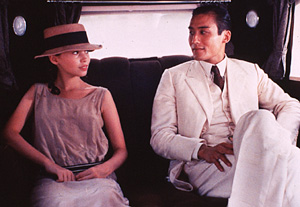ASIAN PARIS
PAGE 2 OF 8
| Asian males also enjoy a better social image than their American counterparts. French women consider Asian men exotic, refined and good lovers. |
The Asian Image
The perception of Asians here is positive on the whole. For example, they are compared favorably to Arabs who are seen as loud and quarrelsome. Asians have a reputation for being hard-working, quiet, successful and well-adjusted. "Asian children make brilliant students," said Micaela Sanchez, a junior-high teacher. "I have three Chinese students, and they are all very serious."
Asian economic success may be even more visible in Paris than in the U.S. because Chinese merchants, who open many stores and restaurants in the French capitol, comprise the largest segment of the Asian community's success stories.
Asian males also enjoy a better social image than their American counterparts. French women consider Asian men exotic, refined and -- get this -- good lovers, according to Sanchez whose ex-husband is Chinese.
"In the United States there is a lot of emphasis on physical strength and appearance, so tall and muscular Caucasian men are more appreciated than Asian men," says Mayako Yamamoto, a Japanese student who lives in Paris but has visited America several times. "The values here are different. You don't have to be tall and strong to be popular. They like you to be gentle and understanding, and Asians are gentle. You also need to be charming, intelligent, seductive, sensual and stylish. I think that in the States, Caucasians always serve as the reference points. You are always compared to them instead of being judged as you are or compared to other Asians like in France. That's why I feel more comfortable here."
Asian physiques don't appear as unusual because the French are generally shorter and slimmer than Americans.
The French also differ from Americans in their attitude toward interracial relationships. It is considered a natural process for immigrants and their descendants, even of non-White races, to have French spouses and meld into the mainstream of society. Whereas in America Caucasians and Asians ponder the phenomenon of interracial marriages, the opposite is true in France. Many French interviewed for this article expressed surprise at the fact that Asians tend to marry within their own communities.
The negative stereotypes about Asians that do exist resemble those held by White Americans, namely, that Asians are mysterious and reserved, the many Chinese are involved in illicit enterprises, and that Chinese and Japanese make unfair business competitors.

The Lover, starring Tony Leung and 16-year-old Jane March, was directed by French director Jean-Jacques Annaud based on an autobiographical novel by French novelist Marguerite Duras. In France Asian men enjoy the reputation of being good lovers.
The French press has occasionally fanned rumors of gambling dens, criminal syndicates, drug and prostitution rings in the Chinese community. But they remain just rumors. The police have found little evidence to support those allegations.
So where do all the stereotypes come from? One obvious source is the portrayal of Asians in the American media and films to which French are exposed. In an article entitled "Soupcons sur le 'Chinatown' Parisien (Suspicions about the Paris Chinatown), a journalist for Le Figaro, a conservative newspaper, admits as much. "Chinatown! This word rings a bell in our mind. At its mention, a box of images opens up. The imposed faces of Fu Manchu and his like, the secret societies, the multicolored and grimacing dragons, the sents of incense and spices, all these intermingle in the imagination of any Westerner who is accessible to a normal degree to fantasy...
"Without the exotic context, this whole thing [allegations of secret societies] would be reduced to a polemic that is vaguely social... but Fu Manchu was watching over us, and the national press quickly became sensational and gave the incident a significance that surprises everyone."
Time and again I read in the French press accounts of Chinese, good or bad, described as Fu Manchu look-alikes. A recent film that is often cited as an influence in the media here is The Year of the Dragon. Three years ago Hong Kong sur Seine (Hong Kong on the Seine), a television movie that was probably an imitation of The Year of the Dragon, was broadcast on a French public channel. It dealt with the same theme -- White police detective fighting Asian secret societies -- as in the American film and provoked loud protests from some Chinese associations. PAGE 3
| PAGE 1 | 2 | 3 | 4 | 5 | 6 | 7 | 8 |
CONTACT US
|
ADVERTISING INFO
© 1996-2013 Asian Media Group Inc
No part of the contents of this site may be reproduced without prior written permission.
